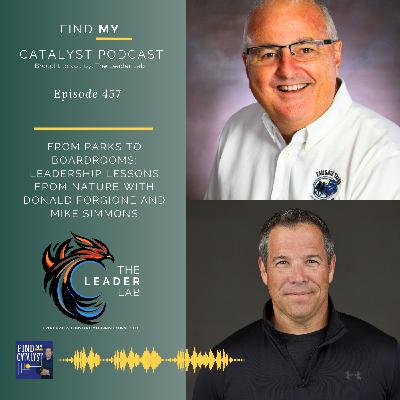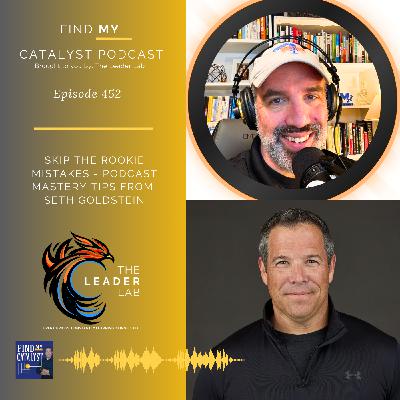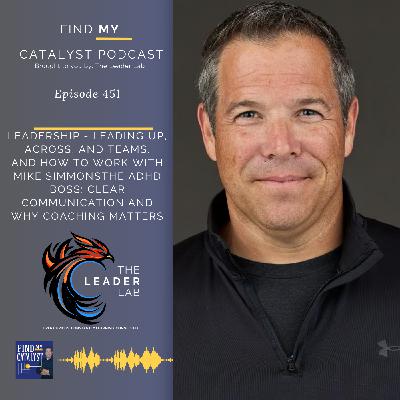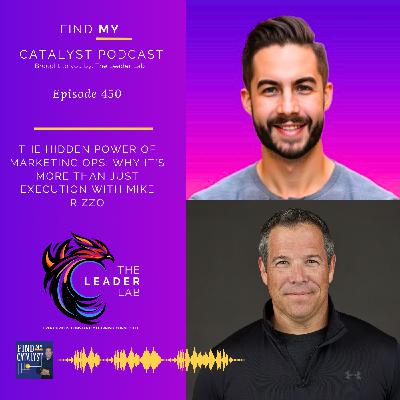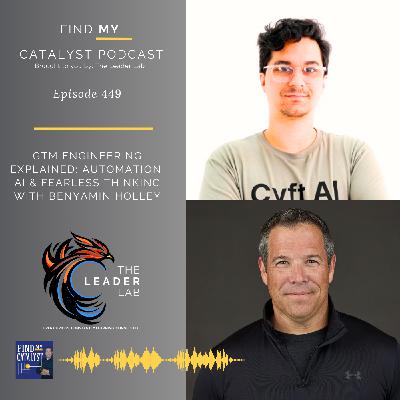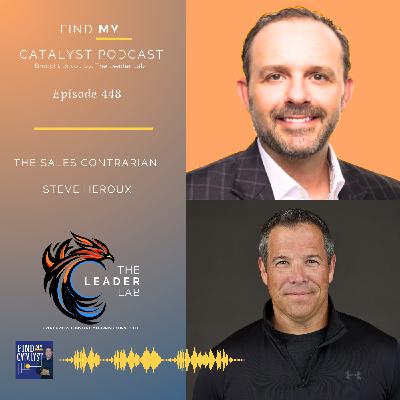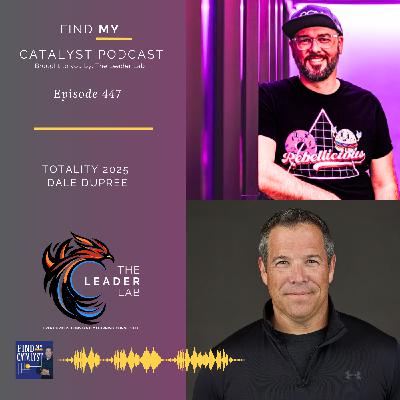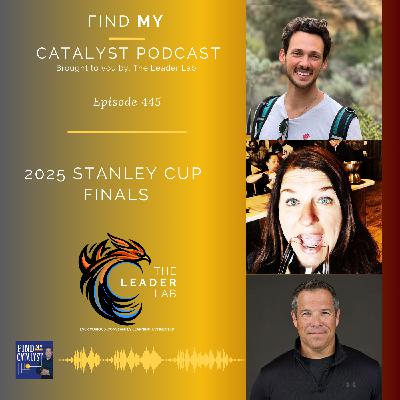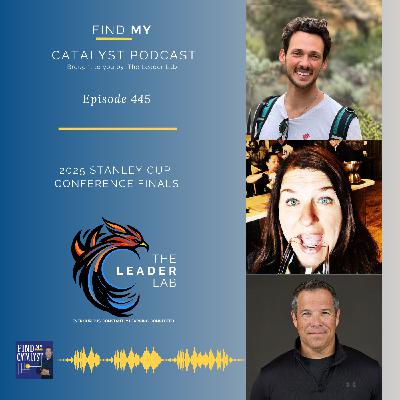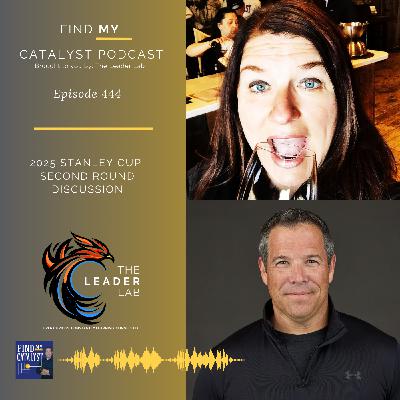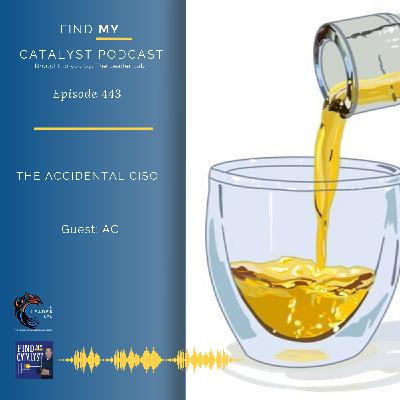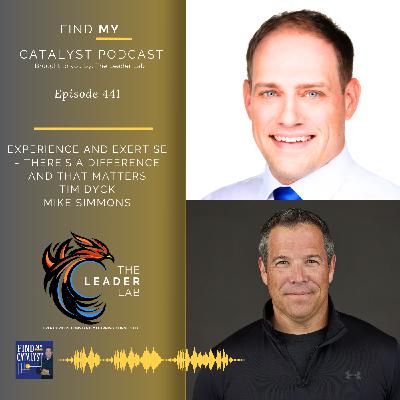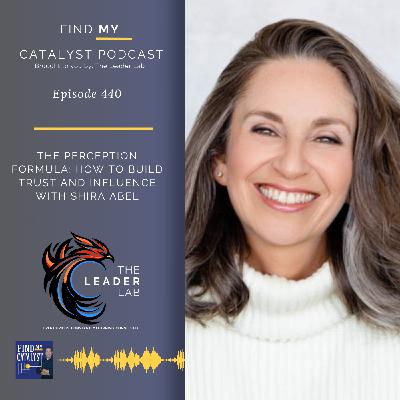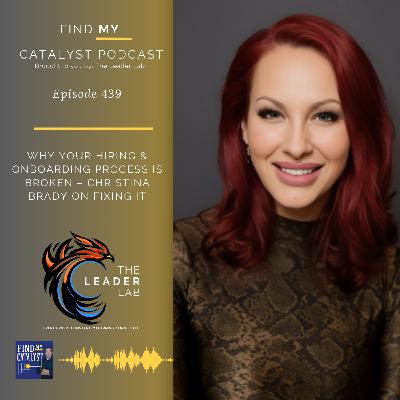Discover Find My Catalyst Podcast
Find My Catalyst Podcast

Find My Catalyst Podcast
Author: Mike Simmons
Subscribed: 104Played: 4,056Subscribe
Share
© 2025 Catalyst Sale
Description
We all have problems we are looking to solve. We know that there are solutions out there, but we struggle with this.
How do we find the solution, where does the nudge come from to help us take the next step, and start solving tough problems. The intention of this podcast is to help you find your catalyst and take that next step.
The Find My Catalyst Podcast is a weekly podcast with Catalyst Sale founder Mike Simmons. We discuss real stories with practical application, in the context of leadership, problem solving, decision making, thinking, goal setting and execution.
Other topics discussed include - Systems, Frameworks, Sales Strategy, Revenue Operations, Training, Onboarding, Sales Enablement, Organization Enablement, Workforce Development, Coaching, and Mentoring.
How do we find the solution, where does the nudge come from to help us take the next step, and start solving tough problems. The intention of this podcast is to help you find your catalyst and take that next step.
The Find My Catalyst Podcast is a weekly podcast with Catalyst Sale founder Mike Simmons. We discuss real stories with practical application, in the context of leadership, problem solving, decision making, thinking, goal setting and execution.
Other topics discussed include - Systems, Frameworks, Sales Strategy, Revenue Operations, Training, Onboarding, Sales Enablement, Organization Enablement, Workforce Development, Coaching, and Mentoring.
462 Episodes
Reverse
Donald Forgione — Former Director of 175 Florida State Parks, with 40+ years in ecotourism, leadership, and public service. Now a business owner, speaker, and coach, Donald connects leadership lessons from nature to business. Mike Simmons — Founder of Find My Catalyst, leadership coach, and sales strategist, helping people identify and act on their catalyst for change. Three Key Quotes Donald Forgione: "Trust is the key to absolutely everything… If they're not feeling what I'm saying, I might as well throw it out the window." Mike Simmons: "A revenue challenge is often a culture challenge in disguise. Culture starts with leadership. Leadership starts with self." Donald Forgione: "Superman ain't coming. You have to be your own Superman, your own Wonder Woman — and figure it out." Mike and Donald explore the deep connections between nature and leadership, revealing how adaptability, trust, and asking the right questions can transform teams and culture. They share real-world lessons from state parks to sales, showing leaders how to align purpose, overcome obstacles, and create environments where people thrive. 5 Key Takeaways – Finding Your Catalyst in Leadership 1. Adaptability is Essential Nature changes daily, sometimes hourly — so do business environments. Leaders must adjust "sails" when conditions shift, not fight the wind. Like a river finding a new path, flexibility keeps momentum moving forward. 2. Trust is the Foundation Without trust, communication falls flat — people must feel you're genuine. Consistent standards and fairness build credibility. Trust enables teams to follow direction, even in tough changes. 3. Ask Better Questions Leaders have an obligation to ask questions others won't. Tone, timing, and context matter — the "tailgate" setting often works best. Asking opens doors to insight; telling can shut them. 4. Sales is Everyone's Job Selling is solving problems, not pushing products. Every role in an organization impacts customer experience. Internal and external "customers" both require thoughtful service. 5. Break Down Silos Customers don't care which department "owns" the problem. Internal collaboration is as important as external service. Remove political barriers so the mission comes first. Find your Catalyst at https://findmycatalyst.com Check out Tailgate Talks at https://tailgate-talks.com/speaker-experience/podcasts/ You Can Put the Work in to Practice, and we'd love to hear about it. Listener Challenge: Your Catalyst Connection This week, take 15 minutes to connect one lesson from nature to your work. Step 1 – Observe: Go for a walk in a park, your neighborhood, or any outdoor space. Notice one thing that stands out — a tree's growth pattern, the way water flows, how animals interact, or even the weather. Step 2 – Reflect: Ask yourself: What obstacle is this natural element facing? How is it adapting or overcoming? How does this mirror challenges in my team or business? Step 3 – Act: Identify one small change you can make in your leadership or work this week inspired by that observation. Example: If you see water rerouting around rocks, consider how you can redirect your team's energy around a roadblock rather than trying to push through it. Share Your Story: Email Mike and Donald with your insight — you might inspire the next podcast conversation.
Fidel Cache Flow is an account executive at a public company and an influential voice in the "burner verse" – the world of anonymous social media accounts. Through his Twitter profile, he openly shares unfiltered takes on tech sales, job stacking, leadership, and career strategies, while also building a thriving community that helps others grow in tech sales. Follow Fidel here: https://x.com/FidelCacheFlow "There's freedom in being anonymous. It lets me speak truthfully without fear." "Job stacking isn't about cheating. It's about working smarter, not harder." "Leadership starts with yourself—even if you don't have a title." In this episode, Fidel Cache Flow explains why he built an anonymous online persona, the rise of job stacking, and how community drives success in tech sales. He shares bold ideas about career growth, leadership, and building trust while staying authentic. This episode challenges traditional work models and inspires independent thinking. 5 Key Takeaways 1. The Power of Anonymity Freedom to share raw, unfiltered ideas Builds confidence to challenge norms Encourages finding your voice despite risks 2. Job Stacking as a Catalyst Multiple income streams create independence Requires strong personal accountability Forces you to rethink time and value 3. Leadership Starts with Self Leadership is influence, not just titles Self-awareness improves teamwork and results Learning leadership early changes your future 4. Community Drives Growth Mentorship accelerates your learning curve Peer groups help solve tough problems Teaching others strengthens your own skills 5. Rethinking Career Paths Big companies provide a strong foundation Smaller roles offer freedom and creativity later Strategic moves can be your career catalyst Find Your Catalyst at https://findmycatalyst.com
Bill Kantor is the co-founder of Funnelcast, a forecasting platform designed to help businesses understand, optimize, and act on their sales pipelines. With decades of experience in sales operations and revenue analytics, Bill is on a mission to shift how companies use forecasting — from chasing accuracy to driving meaningful change. 💬 3 Key Quotes from Bill Kantor: "The job of the forecast is to tell you what to change in order to make the outcome better." "People think the job of the forecast is to tell you what you're going to close. But your sales are not like the weather. You can control the outcome." "Don't chase hyper-accuracy in forecasts — focus on what you can control to change the outcome." Bill Kantor joins the show to challenge the conventional view of forecasting. Rather than striving for accuracy, Bill advocates for forecasts as tools for change. He explains the math behind pipelines, common mistakes in sales forecasting, and how better definitions and insights can empower sales teams to improve outcomes — not just predict them. 🔑 5 Key Takeaways 1. Forecasting Is a Catalyst for Change Forecasts should help you identify where to take action, not predict perfectly. Think of forecasting like coaching — it's about improvement, not prediction. Use forecasting to find leverage in your pipeline, not just to report numbers. 2. You Can't Predict Individual Deals — And That's Okay The idea that you can call specific deals is flawed and statistically impossible. Treat your pipeline as a portfolio — not a list of "yes" or "no" bets. Focus on the distribution of outcomes, not just the "commit list." 3. Pipeline Math is Simple but Powerful Three levers drive outcomes: number of deals, size of deals, and win rate. These factors are dynamic and function over time. Modeling those time-based variables correctly uncovers more accurate and actionable insights. 4. Sales Stages Must Be Clearly Defined Poor stage definitions lead to forecast noise and misalignment. Consistent definitions enable higher forecast fidelity. Clarify criteria for entering and exiting each stage to drive accountability and insight. 5. Tools Don't Replace Thinking Too many teams buy tools before building skills. Forecasting tools like Funnelcast amplify insight but aren't a magic fix. Simplify your model before layering in complexity — get the basics right first. "Why Accurate Sales Forecasts Are Overrated with Bill Kantor" "The Forecast Is Not the Goal: How to Change Outcomes with Bill Kantor" "Forecasting for Impact: Ditch the Guesswork, Embrace the Math" Find your catalyst at https://findmycatalyst.com
St. John "Sinjin" Cramer is a dynamic sales strategist, keynote speaker, and host of the Rural Sales Success podcast. A UK native now based in New Zealand, Sinjin helps businesses understand how to sell with empathy, especially in high-stakes, rural environments. His philosophy? Stop selling. Start serving. "If you don't like where you are—move. Even a small shift can be a catalyst for growth." "Don't sell to farmers—or anyone. Help them make informed decisions." "Be a buyer's assistant. If you're not helping people feel safe in a purchase, you're not selling—you're pushing." Sinjin Cramer shares wisdom from decades in rural sales, exploring why trust and understanding context matter more than tactics. From metaphors on movement and mindset to book recommendations and rugby strategy, this episode uncovers how small actions, curiosity, and service can create lasting transformation—for both buyers and sellers. 🔑 5 Key Takeaways 1. Movement Creates Momentum Small shifts, like rearranging your desk or changing your routine, can spark meaningful change. "Little and often over the long haul" beats intense bursts of action. Movement—literal or metaphorical—fuels growth. 2. Help, Don't Sell Farmers and other buyers don't want to be sold to; they want help making smart, lasting decisions. Shift from "salesperson" to "buyer's assistant" to build trust and long-term success. Sales is a service, not a transaction. 3. Context is Everything Understand the world your customers live in—their risks, community, and long-term vision. Farmers, for example, live with their purchases—literally seeing them every day. Specificity in how you serve different buyers makes all the difference. 4. Trust Is Earned, Not Titled Becoming a "trusted adviser" isn't a label you give yourself—it's a role others bestow on you. It takes time, reps, and a true focus on the buyer's needs. Curiosity and service build credibility over time. 5. Books as Catalysts Books like Man's Search for Meaning, Legacy, and The Talent Code offer timeless insights on mindset, resilience, and leadership. Rereading key books can reinforce principles you're working to live. Reading fiction, too, can ignite creativity and empathy—critical tools for any change-maker. Why You Should Stop Selling and Start Serving: A Masterclass with Sinjin Cramer Little Changes, Big Impact: Sales, Trust, and Movement with Sinjin Cramer Selling to Farmers & Leading with Empathy: Lessons in Rural Sales from Sinjin Cramer Find your Catalyst at https://findmycatalyst.com
Seth Goldstein is a 15-year podcast pro, coach, and former journalist. He runs "Podcast Mastery" and helps new hosts skip common mistakes. Seth's big message: have a simple plan, keep the show real, and hit record—because action is the true catalyst. "If you have a plan and a cadence, it works. When you don't, it usually doesn't." "Your first ten episodes are practice—most people won't even know they exist." "People listen because they want to feel part of the conversation." Seth Goldstein and host Mike Simmons swap straight-talk tips on starting and growing a podcast. They cover gear, planning, guest fit, and why breathing and pressing record beat perfection. The chat shows how small, steady steps turn ideas into a real show—your catalyst for sharing big ideas. 5 Key Takeaways Start Small, Start Now A low-cost mic and headphones are enough. Zoom works—don't wait for fancy tools. Hitting record is the catalyst that moves dreams to action. Make a Simple Plan Pick a release rhythm (weekly, twice-a-month). Know your ideal listener and guest. A clear plan sparks steady progress. Practice Builds Confidence First episodes are mostly for you. Reps polish voice, pace, and stories. Each episode becomes a mini catalyst for the next. Keep It Real Light edits—leave natural pauses and laughs. Listeners bond with honest sound. Authentic voice is a trust catalyst. Measure and Iterate Check basic stats: downloads and listens. Test formats—solo, guest, or hybrid. Data-driven tweaks act as feedback catalysts. "Podcast Beginner? Seth Goldstein's 3-Step Plan to Launch Fast" "From Idea to Mic: Seth Goldstein Reveals the Catalyst for Podcast Success" "Skip the Rookie Mistakes - Podcast Mastery Tips from Seth Goldstein" Find your Catalyst at https://findmycatalyst.com
Mike Simmons, founder of Catalyst and host of the "Find Your Catalyst" podcast, returns for a solo Q&A session. In this episode, he explores how ADHD shows up in leadership, strategies for clear communication, and why coaching is an essential part of personal and business growth. Mike shares personal experiences and systems that help him and others focus, execute, and lead effectively. 💬 3 Key Quotes "Don't diagnose people—understand behaviors and build systems that reduce chaos." "There are things that are said, things that are heard, and things that are remembered—and rarely are they the same." "A coach helps people think differently, see differently, and ultimately do differently." Mike Simmons dives into leadership with ADHD, how communication often breaks down, and the critical role coaching plays in helping people move faster and smarter. With practical tools like priority lists and communication preferences, Mike shows how clarity and systems can be a catalyst for better business and personal outcomes. 🔑 5 Key Takeaways 1. Leading with ADHD: Embrace Focus and Flexibility Leaders with ADHD often juggle many ideas, creating confusion for their teams. Systems and priority lists can reduce stress and clarify direction. Asking "Where does this fit in our priorities?" curbs the chaos of chasing new ideas. 2. Communication is a Two-Way Street Don't assume understanding—validate what was heard. Ask: "What did you hear me say?" to catch misalignment early. Clear definitions help reduce frustration and improve team trust. 3. Define Accountability Clearly Use the framework: Who will do what by when. Color-code notes to track priorities, ideas, and action items. Avoid assumptions—clarity builds accountability. 4. Build and Share Communication Preferences Leaders should express how they prefer to receive information (e.g., text over email). Encourage team members to share their preferences too. Revisit these preferences regularly to improve efficiency. 5. Coaching as a Catalyst Coaching helps people go from where they are to where they want to be. A coach shifts perspectives and simplifies next steps. Mike emphasizes making coaching more visible and accessible for leaders and teams. How to Lead with ADHD: Focus, Systems & Coaching Tips The ADHD Boss: Clear Communication and Why Coaching Matters Said, Heard, Remembered: Mastering Team Communication with Mike Simmons Find Your Catalyst at https://findmycatalyst.com
Mike Rizzo is the founder of MarketingOps.com and the vibrant Mo Pros community—a 6,500+ member strong network dedicated to elevating marketing operations professionals. With a background in martech and a passion for building systems that scale, Mike champions the art of connecting strategy, technology, and people. "Marketing operations is the backbone of strategic success." "Slow down to speed up—operational rigor helps eliminate chaos." "Invest in your community, and it will invest back into you." Mike Rizzo shares how marketing operations drives business success by combining strategy with execution. He explores how the Mo Pros community helps professionals connect, grow, and share. Through clear systems, thoughtful collaboration, and investment in self and others, Mike shows how ops can become a true catalyst for innovation and clarity. 🔑 5 Key Takeaways: 1. Marketing Ops as a Strategic Catalyst It's not just tactical; it underpins strategy and growth. Clear systems and aligned definitions unlock momentum. Marketing ops professionals translate business goals into technical execution. 2. Slow Down to Speed Up Operational rigor avoids repeated mistakes. Standardized onboarding, process, and measurement create efficiency. The best systems are built to support speed through structure. 3. Community is the Shortcut to Growth The Mo Pros community offers peer support, advice, and shared experiences. Professionals thrive when they ask for help and offer it to others. Engagement fuels growth: ask, share, listen, repeat. 4. Invest in Self to Find Your Catalyst Learning communities and workshops accelerate development. Real growth comes from applying skills like communication and problem-solving. Participation leads to deeper insight, connections, and opportunity. 5. The Future of Ops: From Execution to Architecture The goal is not just using tools but designing systems that work. Understanding the "why" behind tools matters more than knowing how to use them. Leadership in ops comes from curiosity, critical thinking, and clarity. "Marketing Ops as a Catalyst: Building Strategy Through Systems with Mike Rizzo" "From Chaos to Clarity: Why Community and Ops Are the Key to Growth" "The Hidden Power of Marketing Ops: Why It's More Than Just Execution" Find Your Catalyst at https://findmycatalyst.com
Benyamin Holley is a "GTM engineer" who blends technical tools and creative problem-solving to revolutionize go-to-market strategies. With a background in music tech and a passion for scrappy, AI-driven workflows, Benyamin brings a fresh, practical approach to solving sales and operations problems. Currently at Sift, he's helping shape how startups use automation to scale smarter, not just faster. "Sales is a thinking process. And if you think well, you can build better systems." "Less is more — I don't want more leads; I want better ones." "Fear of being wrong holds people back. But if you're doing something good, the world conspires in your favor." Benyamin Holley joins the show to share how he's redefining sales and go-to-market strategies using AI and automation. From his roots in music education tech to pioneering GTM engineering at Sift, Benyamin dives deep into what it means to proactively solve problems, embrace tools like Clay, and find true product-market fit. 🔑 5 Key Takeaways 1. GTM Engineering Is a Thinking Process GTM (go-to-market) engineering isn't just a buzzword—it's a mindset. It involves problem-solving across the sales funnel using AI and automation. You don't need to be a coder, just scrappy and optimistic. 2. Start with the Right Fit Whether it's customers, culture, or tools, fit reduces friction. Good fits feel like "no-brainers"—they flow without forcing. If you're constantly battling resistance, it may not be the right match. 3. Fear Stops Progress People often hesitate to act because they fear being wrong. Startups thrive when people tackle problems without waiting for approval. Building confidence through small wins helps overcome this fear. 4. The List Is the Strategy Outbound success depends on building a high-quality, well-qualified list. Tools like Clay help isolate the right leads with fewer but better targets. Relevance in outreach increases connection and reduces noise. 5. Let Robots Do the Busywork Automation isn't about replacing humans, but enhancing them. Benyamin shares how AI tools manage waitlist follow-ups automatically. Freeing time from manual tasks lets people focus on meaningful conversations. "From Music Tech to GTM Engineer: Benyamin Holley on Sales Innovation with AI" "Why Less Is More in Sales: Benyamin Holley's Playbook for Smarter Outreach" "GTM Engineering Explained: Automation, AI & Fearless Thinking with Benyamin Holley" Find Your Catalyst at https://findmycatalyst.com
Steve Heroux is a sales thought leader, author of The Sales Contrarian, and founder of The Sales Collective. Known for his humorous and no-fluff approach, Steve challenges outdated sales methodologies and champions a people-first philosophy. With roots in comedy and admiration for icons like Bob Ross and Larry David, Steve brings heart and honesty into the world of sales, coaching, and leadership. "He didn't paint to show you how good of a painter he was. He painted to show you how good of a painter you could be." – On Bob Ross's influence and philosophy. "Selling ice to an Eskimo doesn't make you a great salesperson. It makes you an asshole." – On ethical, value-driven sales. "You have to teach people how to swing like them, not like you." – On individualized coaching and leadership. Steve Heroux joins the podcast to dismantle traditional sales myths, challenge robotic training, and advocate for purpose-driven selling. From detaching from outcomes to building self-awareness, Steve shares personal stories and strategies that ignite self-leadership and redefine success—proving that joy, ethics, and humility are the real game changers in sales. 🔑 5 Key Takeaways 1. Sales Isn't About Scripts—It's About Humanity Robotic scripts kill connection; human presence builds trust. Salespeople should call audibles, just like smart quarterbacks do. Be you—your unique voice is your catalyst. 2. Detach from Outcomes to Drive True Performance Obsessing over quotas leads to burnout and misalignment. Focus on inputs you can control: preparation, practice, and care. Daily performance indicators (DPIs) matter more than KPIs. 3. Failure Is Not the Opposite of Success—It's Part of It Real learning comes from being wrong, not being right. Self-awareness starts with admitting mistakes. Humor and humility unlock better performance. 4. Gamify What Matters—The Process, Not Just Results Use point systems to reward meaningful actions (thank you notes, learning). Make the work fun and joyful—like fishing or painting. Execution creates consistency; passion sustains it. 5. Leaders Must Coach the Individual, Not the Group One-size-fits-all training is outdated and ineffective. Great leadership develops the person's swing, not the leader's swing. Sales DNA assessments reveal unique strengths and blind spots. "Why Sales Quotas Are Broken: Steve Heroux on Ethical Selling and Self-Leadership" "Sales Without Scripts: Steve Heroux on Finding Your Voice and Letting Go of Outcomes" "From Bob Ross to Sales Boss: Steve Heroux Redefines Success in Business" Find Your Catalyst at https://findmycatalyst.com
Dale Dupree is the founder of The Sales Rebellion and a dynamic thought leader in modern sales. Known for his rebellious mindset and deeply human approach, Dale challenges traditional business thinking. He shares his love for nature, the power of curiosity, and his vision for Totality—a transformative experience that's reshaping what a business conference can be. "Change exists on a daily basis for me. So I don't live in comfort or stagnation." "We can't reflect on what we're going to do—you have to do it, then reflect." "Totality is a mix of medicine and enlightenment. It's about thinking much deeper about your existence." Dale Dupree reflects on his journey from urban life to the mountains, the importance of community and discomfort, and how these lessons shaped Totality 2025. He reimagines business experiences by emphasizing creativity, human connection, and inner exploration. This episode is about finding your catalyst by embracing unpredictability and authenticity. 🔑 5 Key Takeaways 1. Discomfort Is a Catalyst for Growth Leaving comfort zones leads to personal clarity and transformation. Dale's story—from city life to mountain quiet—reflects this principle. Challenges force us to reevaluate what really matters. 2. Authenticity Fuels Connection Dale values genuine interaction over polished personas. Small-town experiences gave him meaningful community bonds. Totality mirrors this by removing conference fluff in favor of real talk. 3. Curiosity Is the Rebel's Tool Asking "what else is there?" breaks the cycle of complacency. Exploration is not just physical—it's emotional and intellectual. Rebelling isn't destruction; it's deep curiosity in action. 4. Creativity Transforms Sales and Life Creativity is often undervalued in sales, but it's a game changer. Totality brings hands-on, unexpected experiences to foster it. Real innovation starts by doing things differently—and with feeling. 5. Designing Experiences Creates Lasting Impact Pairing music and scent with moments enhances memory and meaning. Dale blends sensory cues and mystery to create Totality's magic. People remember how you made them feel—not just what you said. "Dale Dupree on Why Discomfort Is the Key to Living Fully" "Totality 2025: Reinventing the Sales Conference Experience" "The Rebellion Begins: Dale Dupree on Curiosity, Community & Creativity" Find your Catalyst at https://findmycatalyst.com
Tim Dyck is the founder of Best Culture Solutions and a seasoned expert in leadership development, employee engagement, and culture transformation. With a strong background in designing meaningful customer and team experiences, Tim is passionate about helping businesses thrive through intentional design and fractional leadership. "Leadership starts with self. Leaders build leaders." – Highlighting the importance of designing a process that begins with personal discipline. "If you don't have a process, how can you expect to achieve repeatable results?" – Emphasizing the foundational role of process in business and leadership success. Mike and Tim explore how fractional work can help businesses fill critical gaps fast, manage uncertainty, and create memorable customer experiences. They break down leadership mindset, designing for success, and why managing expectations matters. This episode helps leaders rethink how they structure their team, processes, and strategy with clarity and intent. 🔑 5 Key Takeaways 1. Fractional Work Is Strategic, Not Temporary Fractionals help close gaps quickly without long-term commitment. They offer deep expertise in areas the business needs most. Fractional roles allow companies to stay agile during uncertain times. 2. Designing for Experience Builds Trust Consistency in customer and team experience increases loyalty. Details matter—like the entrance to a ballpark or a product touchpoint. Poorly designed experiences break trust and create risk. 3. "Weenies" Keep Momentum Borrowing from Disney, "weenies" are milestones or visuals that pull people forward. Every process should include visible progress markers to reduce confusion. These checkpoints build confidence and clarity in a journey. 4. Process Creates Repeatable Results Jumping from A to Z rarely works—stepping stones reduce risk. Leaders should design backward (from the goal) and execute forward. A thoughtful process builds momentum and enables consistent delivery. 5. Mindset and Self-Discipline Drive Success Many leaders struggle due to lack of focus and process. True leadership begins with managing oneself effectively. Clear mindset = clarity of goals + consistent actions + defined expectations. Why Fractional Leaders Drive Faster Business Impact Designing for Experience: Lessons from Disney and Fractional Strategy The Power of Process: How Fractional Work Builds Clarity and Trust 📈 Podcast Improvement Suggestions Add a listener story or case study: Real-world success from a fractional project would deepen connection and credibility. Use audio chapters: Segmenting by topic (mindset, design, process) improves replay value. Summarize steps visually: A one-page PDF download of the "design backward, execute forward" model could increase engagement. Learn. Think. and Act. with us every Sunday. Our Sunday email is filled with sections dedicated to helping leaders Learn. Think. and Act. These short weekly emails will help you make a difference and accelerate speed to impact at work, with self, and within your family. Subscribe here: https://www.findmycatalyst.com/learn-think-act-opt-in
Jacquelyn: "It honestly looked like a high school or college team was playing a professional team." Constantine: "Passion. Commitment. Tenacity. These guys live and breathe this shit." The crew recaps Round 2 of the Stanley Cup playoffs, confessing their inaccurate picks and celebrating Constantine's 50% accuracy. With deep hockey insight and hilarious banter, they preview the East and West Conference Finals, reveal their personal favorites, and emphasize the emotional, strategic, and human side of playoff hockey. 🔑 5 Key Takeaways 1. Finding a Catalyst in Failure Jacquelyn admits picking the Leafs was a mistake—owning failure leads to better choices. The group learns from incorrect picks to sharpen predictions for the next round. Recognition of poor team performance (like the Caps) becomes a call to realign and refocus. 2. Performance Under Pressure Constantine praises players like Ottinger and Bobrovsky for stepping up in high-stakes moments. The playoffs reveal which players rise when it counts most. Success is tied not just to talent but to composure under fire. 3. Respect and Resilience in Sport The team highlights the powerful sportsmanship seen in handshakes and honoring personal struggles (e.g., Scheifele's loss). Emotional intelligence and empathy make great athletes greater. Team support and unity often become the catalyst for comeback performances. 4. The Power of Passion "Live and breathe this shit"—Constantine's line underscores the deep love for hockey. The community's passion, including fans and commentators, fuels the game's momentum. Passion is infectious; it inspires action and elevates purpose. 5. Bold Predictions Drive Engagement All three make distinct, thoughtful predictions, showing conviction despite past mistakes. Debating outcomes encourages critical thinking and creative confidence. Even incorrect calls create opportunities to reflect, learn, and improve—hallmarks of catalyst-driven thinking. Learn. Think. and Act. with us every Sunday. Our Sunday email is filled with sections dedicated to helping leaders Learn. Think. and Act. These short weekly emails will help you make a difference and accelerate speed to impact at work, with self, and within your family. Subscribe here: https://www.findmycatalyst.com/learn-think-act-opt-in
This lively roundtable features hockey fans Mike, Constantine, and Jacqueline as they break down the 2025 NHL Conference Finals. From unexpected losses to bold predictions and favorite hockey movies, their passionate insights and friendly banter bring energy to every play and player discussed. 🗣️ Key Quotes "Sales is a thinking process. Business is a thinking process. Life is a thinking process. How are you thinking different about your process?" – Mike "It honestly looked like a high school team was playing a professional team." – Jacqueline on the Capitals' performance. "Connor McDavid deserves the chance to earn a Stanley Cup." – Constantine In this episode, the crew dives into the NHL Conference Finals with unfiltered opinions, emotional takes, and hilarious side commentary. They revisit missed predictions, analyze key players and coaches, and share their picks for who moves on. It's all about hockey, heart, and how perspective can be your catalyst. 🔑 5 Key Takeaways 1. Bold Predictions & Upsets No one saw the Jets getting dominated by Dallas. Edmonton's strong playoff showing surprised the group. Everyone chose the Panthers to win, even if they secretly rooted for the Hurricanes. 2. Mental Game is the Real Game The Leafs' emotional collapse highlighted playoff pressure. The Caps looked lost on the ice—poor positioning and ineffective power plays. Focus and mental resilience were discussed as crucial catalysts. 3. Respect Runs Deep in Hockey The handshake line after Game 7 was praised for its emotional weight. Mark Scheifele's emotional performance reminded listeners of hockey's human side. Respect and tradition were spotlighted as hidden catalysts for unity and growth. 4. Coaching as a Catalyst Brind'Amour and Paul Maurice received high praise for leadership. Coaching decisions and team mentality are game-changers in playoffs. Great coaching bridges talent and execution under pressure. 5. Pop Culture Meets Passion Favorite hockey movies? "Miracle" and "Mighty Ducks" win hearts. Lundqvist's Netflix doc and commentary team banter added depth to the fandom. Loving the game—on and off the ice—is a reminder that passion is the true catalyst. Learn. Think. and Act. with us every Sunday. Our Sunday email is filled with sections dedicated to helping leaders Learn. Think. and Act. These short weekly emails will help you make a difference and accelerate speed to impact at work, with self, and within your family. Subscribe here: https://www.findmycatalyst.com/learn-think-act-opt-in
This episode features a lively, hockey-fueled roundtable with Jacquelyn Nicholson, Constantine Johns, and host Mike Simmons. The trio dives into the second round of the 2024 Stanley Cup Playoffs, sharing personal stories, team loyalties, spirited banter, and insightful predictions—all through the lens of sports as a catalyst for connection, memory, and emotion. "Playoff hockey, hands down, is the best entertainment I've ever seen." – Constantine Johns In this high-energy episode, Jacquelyn, Constantine, and Mike dissect round one of the Stanley Cup Playoffs and make bold predictions for round two. With deep personal ties to the sport, they explore how hockey has shaped their memories and identity, proving sports can be a powerful catalyst in life. 🔑 5 Key Takeaways: 1. Sports Create Catalytic Memories Constantine recalls growing up watching Patrick Roy and the Avalanche lift the Cup. Jacquelyn shares childhood memories of fuzzy-TV Blackhawks games and tabletop hockey. Mike remembers frozen pond skating and the thrill of playoff intensity. 2. Shared Passion Builds Community The team has fun tracking predictions, brackets, and emotional team support. Friendly rivalries and shared experiences form strong bonds. Their family traditions (like mailing a plastic Stanley Cup) reinforce connection. 3. Resilience as a Game Changer Mike highlights how goalie Connor Hellebuyck overcame adversity in Game 7 as a catalyst moment. Constantine expresses heartbreak over the Avalanche loss, linking emotion to team loyalty. They emphasize how players grow stronger under playoff pressure. 4. Bias, Loyalty, and Fun Drive Engagement The crew openly admits their emotional (not always logical) picks. Teams like the Leafs, Oilers, and Panthers stir heated opinions. The playful tension among the group reveals how personal investment drives deep passion. 5. Change and Transition Spark Strong Reactions The Arizona Coyotes' move to Utah triggered strong emotional reactions. Nostalgia for local teams and childhood connections fueled frustration and loss. These changes highlight how teams often serve as emotional anchors. Learn. Think. and Act. with us every Sunday. Our Sunday email is filled with sections dedicated to helping leaders Learn. Think. and Act. These short weekly emails will help you make a difference and accelerate speed to impact at work, with self, and within your family. Subscribe here: https://www.findmycatalyst.com/learn-think-act-opt-in
The Accidental CISO (AC) is an anonymous voice in cybersecurity who stumbled into the Chief Information Security Officer role through a mix of timing, skill, and necessity. With a background in IT operations and service delivery, AC found unexpected purpose, community, and a platform for candid reflection on security, leadership, and personal growth. He now hosts The Mindful Business Security Show, educating SMB leaders on practical security. 🧠 Three Key Quotes "I was just looking for a place to vent. I didn't want to get fired for telling the truth." "Security exists at the confluence of people, process, and technology—it's not just about tools." "I'm more me under the persona than I actually am in real life." ✏️ 50-Word Summary In this episode, The Accidental CISO shares how he unintentionally stepped into a security leadership role, the power of anonymity, and how embracing his alter ego helped him find community, confidence, and a calling. He dives into the human side of cybersecurity, masking, and helping others through authenticity and honesty. 🔑 5 Key Takeaways 1. You Can Find Purpose Through Unplanned Paths AC became a CISO by accident, not ambition. He leaned into unfamiliar responsibilities and grew into the role. Sometimes, your catalyst finds you before you find it. 2. Anonymity Can Be a Catalyst for Authenticity Online anonymity gave AC a safe space to express frustrations and truth. He found a vibrant community that shared his struggles and passions. His persona became more "real" than the masked version of himself at work. 3. Security Is a Business Enabler, Not a Barrier AC believes in collaborative security—not saying "no" but saying "yes, and…" Security must align with business goals and risk tolerance. He views security as a multiplier when built with context and care. 4. Risk Is Inevitable—Managing It Is Leadership Risk is part of doing business and drives innovation. A mature approach balances safety with operational freedom. Security teams should advise, not own, risk decisions—that belongs to leadership. 5. Self-Awareness and Community Fuel Growth AC's journey helped him understand and support his own neurodiversity. His experiences empowered deeper connection with his children, who face similar challenges. Real leadership starts with knowing who you are and finding your people. Learn. Think. and Act. with us every Sunday. Our Sunday email is filled with sections dedicated to helping leaders Learn. Think. and Act. These short weekly emails will help you make a difference and accelerate speed to impact at work, with self, and within your family. Subscribe here: https://www.findmycatalyst.com/learn-think-act-opt-in Follow AC at - https://www.accidentalciso.net/
"It is playoff hockey time—the best time of year." "If you're not a hockey fan, become one during the playoffs; the intensity is absolutely amazing." "Find a player, find a team, find a story—and enjoy your playoff hockey journey." Mike and Jacqueline break down the opening round of the 2025 NHL Stanley Cup Playoffs. They compare their brackets, share hockey fandom stories, and highlight key players to watch. It's a mix of friendly banter, expert insights, and encouragement for new fans to fall in love with playoff hockey's unmatched excitement. 1. Passion Powers Persistence Playoff hockey demands unmatched intensity—players dig deep to win. Fans' passion creates lasting loyalty, driving deep team connections. Find your personal "playoff moment" to ignite passion in your work or life. 2. Embrace the Unexpected Playoff upsets and overtime games show that anything can happen. Embracing uncertainty builds resilience and reveals hidden strengths. Catalysts often emerge from surprising, pressure-filled moments. 3. Choose Heart Over Logic Sometimes Heart picks (like cheering for the Senators) bring joy even if risky. Emotional decisions, when thoughtful, can lead to meaningful experiences. Don't be afraid to follow your heart when finding your catalyst. 4. Community Strengthens the Journey Hockey communities create bonds that last beyond the season. Shared experiences and team spirit are vital for long-term motivation. Building a community around your catalyst can speed up your growth. 5. Love the Process, Not Just the Outcome Win or lose, playoff hockey is about the journey, not just the Cup. Progress, learning, and enjoyment are key parts of finding fulfillment. Focus on the small wins and personal growth along your catalyst journey. Learn. Think. and Act. with us every Sunday. Our Sunday email is filled with sections dedicated to helping leaders Learn. Think. and Act. These short weekly emails will help you make a difference and accelerate speed to impact at work, with self, and within your family. Subscribe here: https://www.findmycatalyst.com/learn-think-act-opt-in
Mike Simmons is a leadership and operations expert who helps organizations drive growth through clarity and execution. He leads initiatives through Find My Catalyst, offering services in leadership, revenue, and operations. Tim Dyck brings deep experience in recruitment and people strategies. He is the founder of Best Culture Solutions, helping companies build great teams with purpose. Together, Mike and Tim dive into the nuances of fractional leadership, sharing hard-won lessons, memorable metaphors, and actionable insights. 💬 Three Key Quotes "Don't mistake knowledge for experience. And don't mistake experience for expertise." "If you're hiring a fractional leader, make sure they've run out of gas before—because they'll know how to get you back on the road." "Learning is great. But presenting yourself as an expert without experience can do more harm than good." 📌 50-Word Summary Mike Simmons and Tim Dyck unpack the world of fractional work, using real-life analogies to explain the value of experience and the risk of surface-level knowledge. They share the difference between knowing, doing, and mastering—and how true expertise accelerates impact. A must-listen for leaders hiring with intention. 🔑 5 Key Takeaways 1. The Fuel Tank Metaphor for Expertise Experience is knowing how far your vehicle can go on empty. True experts have broken down before—and know how to recover fast. Awareness, experience, and expertise are not the same—and each plays a different role. 2. Beware of Shallow Expertise Surface-level learners can use the right words but may not deliver results. Using tools like ChatGPT doesn't replace real-world experience. Misrepresented expertise can harm organizations and delay progress. 3. Fractional Leadership is Not for Learners Fractional leaders must already know how to solve the problem you have. They're not there to "figure it out"; they're there to execute. Expecting quick results means you need someone who's already done the work. 4. Simplify to Accelerate Speed to Impact Complexity slows progress; simplify by removing what's unnecessary. Clear next steps fuel momentum in leadership and operations. Fractional experts help reduce overwhelm and focus on what matters. 5. Align Role with Readiness Use readiness assessments before hiring fractional talent. Match the right expert to the right job—based on proven track record. Fractional success is rooted in fit, not just availability. Learn. Think. and Act. with us every Sunday. Our Sunday email is filled with sections dedicated to helping leaders Learn. Think. and Act. These short weekly emails will help you make a difference and accelerate speed to impact at work, with self, and within your family. Subscribe here: https://www.findmycatalyst.com/learn-think-act-opt-in
Shira Abel is a marketing and sales expert with over 25 years of experience, having built a seven-figure agency specializing in account-based marketing (ABM). She is the creator of the Perception Formula, a framework that helps people understand trust, communication, and decision-making in business and relationships. Shira's expertise spans startups, team dynamics, and behavioral economics, making her a powerful speaker and consultant. Key Quotes: "Trust isn't just about intent—it's about understanding how someone thinks." "If your business relies on manipulation, it won't last—trust builds long-term success." "The golden rule isn't enough; you need to adapt to how others think and perceive the world." Shira Abel shares the Perception Formula, a framework built on heuristics, hormones, history, and heritage, to improve trust, sales, and team dynamics. She discusses cultural communication differences, feedback, and how perception shapes success. Whether in startups, leadership, or personal growth, understanding how people think can be your greatest catalyst. https://www.linkedin.com/in/shiraabel/ 5 Key Takeaways: 1. The Perception Formula: Understanding How People Think Perception is shaped by heuristics (mental shortcuts), hormones, history, and heritage. Without emotional connection, people won't remember or trust you. Aligning with someone's background improves communication and decision-making. 2. The Role of Trust in Sales, Marketing, and Teams Trust isn't about manipulation—it's about delivering real value. High-value sales rely on relationships, not tricks. Cultural differences impact trust (e.g., "ask" vs. "hint" communication styles). 3. Feedback: The Key to Growth and Learning Feedback helps you iterate and improve faster. "Nice" people avoid tough conversations; "kind" people tell the truth to help others grow. The best teams and leaders actively seek and apply feedback. 4. Hormones and Decision-Making: The Science Behind Influence Dopamine drives excitement and engagement (e.g., notifications, rewards). Cortisol (stress hormone) blocks clear thinking—positive reinforcement is key. Oxytocin and serotonin create trust and belonging in teams and customer relationships. 5. Coachability: The Differentiator Between Success and Failure Coachability is not about instant agreement—it's about long-term adaptation. The most successful people take feedback, reflect, and adjust. Leaders should observe who listens, applies feedback, and improves over time. Want to level up your thinking and leadership? 💡 Learn. Think. and Act. with us every Sunday. Our Sunday email delivers insights to help leaders accelerate their impact at work, in life, and in their families. 📩 Subscribe here: https://www.findmycatalyst.com/learn-think-act-opt-in
Christina Brady is a sales leader, entrepreneur, and the CEO of Luster.ai, a company dedicated to measuring and improving sales proficiency through AI. With 18 years of experience in sales, she is passionate about fixing broken hiring and onboarding processes and enabling professionals to succeed. Christina is also the Chicago Chapter Head of Pavilion and serves on the executive team at Women in Sales. Three Key Quotes from Christina Brady "If you don't measure proficiency, you don't know who you're hiring, how to up-level them, or why they struggle." "AI isn't here to replace you—it's here to make you better at what you do." "Founders have 'magic' because they know the mistakes that have been made and the risks they're willing to take. You can't expect a new hire to replicate that." In this insightful conversation, Christina Brady discusses why hiring and onboarding in sales are fundamentally broken and how AI can transform proficiency measurement. She also breaks down the "founder magic" that makes transitioning from founder-led to AE-led sales so difficult. This episode is a must-listen for leaders looking to scale effectively. 5 Key Takeaways on Finding Your Catalyst 1. The Hiring Process is Fundamentally Broken Companies often hire without a clear understanding of what makes a candidate successful. The interview process is subjective, leading to mismatches between candidates and roles. Relying on past success (e.g., quota attainment at another company) does not predict future success. 2. Onboarding Needs to Be Personalized and Continuous Most onboarding programs are generic and fail to address individual deficiencies. Employees are often left confused after onboarding, with no clear roadmap for success. The best organizations move from "onboarding" to "everboarding," offering continuous training and development. 3. Measuring Proficiency is the Key to Success Companies struggle because they don't objectively measure proficiency at the skill level. AI tools can now map skills, identify deficiencies, and predict performance gaps before they become issues. Without measurement, companies rely on subjective "gut feelings," leading to inefficiencies and lost talent. 4. AI is a Tool for Enablement, Not Replacement AI should be used to enhance human capability, not replace it. The right AI tools help sales teams avoid revenue-impacting mistakes before they happen. Leaders must shift their mindset from fear to experimentation when adopting AI. 5. Founder-Led Sales is a Different Game Founders have "magic" because they understand the product deeply and can flexibly adjust deals. Expecting an AE to replicate a founder's selling process is unrealistic. The transition from founder-led to AE-led sales requires a structured process, proper tooling, and realistic expectations. Final Thought Learn. Think. and Act. with us every Sunday. Our Sunday email is filled with sections dedicated to helping leaders Learn. Think. and Act. These short weekly emails will help you make a difference and accelerate speed to impact at work, with self, and within your family. Subscribe here: https://www.findmycatalyst.com/learn-think-act-opt-in
Jordan Benjamin is a mindset and sales expert passionate about helping people unlock their full potential. With a background in sales leadership and coaching, Jordan shares insights on resilience, professional growth, and the power of mindset. He emphasizes the importance of taking action, embracing failure, and building a strong network for success. Three Key Quotes from Jordan Benjamin: "The best ideas don't come from grinding at your desk—they come when you create space, like taking a walk or being in the shower." "Authenticity is showing up as an imperfect human. None of us have all the answers—we're all making it up as we go." "It's not about winning or losing—it's about winning or learning. Every failure is a chance to grow." Jordan Benjamin joins the podcast to explore the power of mindset, resilience, and authenticity in professional and personal growth. He shares actionable strategies for overcoming fear, embracing failure, and developing habits that lead to success. From taking small steps to seeking coaching, Jordan's insights help listeners find their catalyst for lasting change. Five Key Takeaways: 1. The Power of Nature and Taking Breaks Stepping away from work for a walk or time in nature can spark creativity and reduce stress. Short breaks can be more effective than grinding through mental blocks. Small moments of mindfulness, like deep breathing, can improve focus and decision-making. 2. The Mindset Shift: Growth vs. Fixed Thinking A growth mindset helps you see obstacles as opportunities rather than dead ends. Failure is not the opposite of success—it's a part of the process. Reframing challenges as learning experiences builds long-term resilience. 3. The Importance of Coaching and Accountability A coach provides an outside perspective that helps you see blind spots. Real change happens between coaching sessions, through consistent action. Accountability helps reinforce new habits, making long-term transformation possible. 4. Authenticity as a Strength, Not a Weakness True leaders embrace their imperfections and encourage vulnerability in others. Everyone struggles with self-doubt—imposter syndrome is normal, even for top performers. Asking for help is a sign of strength, not weakness. 5. Taking Small, Consistent Steps Toward Change Massive change starts with small, manageable actions (e.g., one deep breath, one extra sales call). Repetition strengthens habits and rewires the brain for success. Making a goal easy and achievable increases the likelihood of long-term commitment. Join Us Every Sunday! Learn. Think. Act. with us every Sunday. Our weekly email is filled with insights to help leaders accelerate their impact in work, life, and family. Subscribe here: Find My Catalyst - Learn, Think, Act


